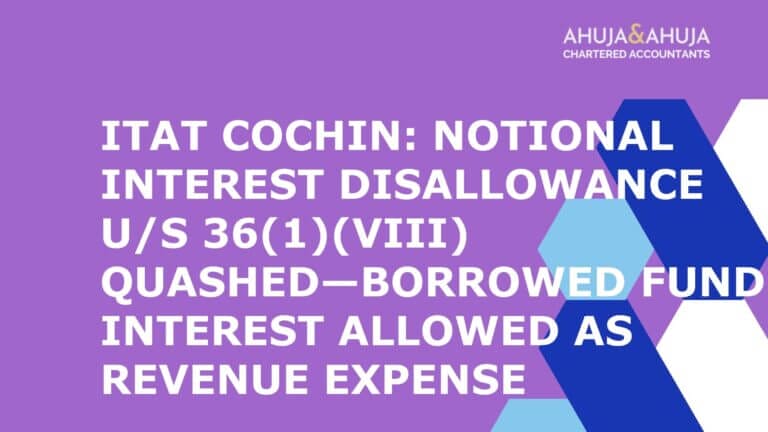Know All About Tax on Dividend Income
Dividend income is a significant form of revenue for investors, stemming from investments in shares or mutual funds.
These payments are essentially a portion of a company’s profits, distributed to shareholders based on the number of shares they hold.
Though dividends appear to be straightforward revenue, their taxation can be complex, especially after recent changes in law.
This article delves deep into the intricacies of dividend income and its associated tax implications, equipped to guide both novice and seasoned investors.
What is Dividend Income?
A dividend is a reward that companies distribute to their shareholders, usually derived from the profits earned.
If you’re engaged in stocks, Unit Linked Insurance Plans (ULIPs), or mutual funds, dividends are a form of return on your investment.
However, under Section 2(22) of the Income-tax Act, dividends encompass not only direct profit-sharing but also include:
- Distribution of accumulated profits, entailing release of the company’s assets.
- Distribution in the form of debentures or deposit certificates from accumulated profits.
- Buy-back of shares distributions during company liquidation out of accumulated profits.
- Distributions made from accumulated profits during a reduction of company capital.
- Advances or loans given by a closely held company to its shareholders from accumulated profits.
Sources of Dividend
Dividends can be received from multiple sources, each attracting different tax treatments:
- Domestic Companies: Dividends received from domestic companies wherein you have invested.
- Foreign Companies: Investments in foreign stocks may also yield dividends, however, the tax implications differ from domestic sources.
- Equity Mutual Funds: Choosing the dividend option in these funds will provide periodic dividends based on fund performance.
- Debt Mutual Funds: Similar to equity mutual funds, opting for dividends can provide regular income, dependent on the achievement of the fund.
Understanding the source of your dividend income is crucial as it lays the ground for their taxation under the prevailing laws.
Historical Context and Modern Changes in Dividend Taxation
Prior to the Finance Act, 2020, dividends issued by Indian companies were subject to Dividend Distribution Tax (DDT), which the companies paid before any distribution, thus exempting the individual investor from tax under section 10(34) of the Income-tax Act.
However, if dividends exceeded Rs. 10 Lakh, they attracted an additional tax under Section 115BBDA.
The shift introduced by the Finance Act, 2020, marked a significant turn from the earlier system. DDT was scrapped, and dividends were made taxable in the hands of the shareholders, irrespective of the amount, aligning with the classical system of taxation.
This means all dividends are now added to the “Income from Other Sources” and taxed according to the applicable slab rates of the individual.
Importance of Audit and Assurance
To navigate through these changes efficiently and ensure compliance with the current tax structure, seeking professional audit and assurance services proves beneficial.
They not only help in accurate reporting of such income but also aid in structuring your investments to maximize post-tax returns.
In the forthcoming segments, we will explore further the specifics of TDS on dividends, advance tax implications, double taxation relief, and practical insights for managing your dividend taxation effectively.
Tax Implications Based on the Source of Dividend
When it comes to taxing dividends, the source of the dividend plays a crucial role in determining the tax treatment. Let’s break down the different sources and their respective implications:
Dividends from Domestic Companies
- With the abolishment of Dividend Distribution Tax (DDT) post-April 2020, dividends received from domestic companies are now taxable in the hands of the shareholders at their applicable income tax rates. It’s important to remember these dividends need to be declared under “Income from Other Sources” when filing your tax returns.
Dividends from Foreign Companies
- Dividends received from foreign entities are taxable in India at the normal income tax rates applicable to you. This is crucial for residents who invest in international equities. However, one may avail relief under the Double Tax Avoidance Agreement (DTAA), provided both India and the foreign country have an effective treaty in place.
Equity and Debt Mutual Funds
- Just as with shares, dividends from both equity and debt mutual funds are taxable under the head “Income from Other Sources.” They are taxed at the income tax slab rates applicable to the investor, post the Finance Act, 2020.
Classifying Dividend Income: Trader vs. Investor
The classification of an individual as either a trader or an investor also significantly impacts how dividend income is taxed:
- Trader: If you are classified as a trader, the dividends are considered business income. This allows you to deduct business expenses that are directly related to the generation of that income.
- Investor: For investors, dividends are taxed as other income, and only limited deductions, like interest expense incurred to earn that income, up to a maximum of 20% of the dividend received, are allowed.
Deductions and Allowable Expenses
While handling taxes on dividends, understanding what deductions you are eligible for can help in reducing your taxable income:
- For Business Income: All relevant expenses incurred to earn the dividend can be claimed. This includes brokerage fees, collection charges, and interest on money borrowed to invest.
- For Other Income: The deduction is generally restricted to the interest expense incurred to earn such dividends and is capped at 20% of the dividend income received.
Tax Deduction at Source (TDS) and Its Implications
Post-2020, TDS regulations have also changed for dividends:
- Domestic Dividends: A TDS of 10% is applicable on dividend income over ?5,000. This ensures part of your tax liability is prepaid and recorded.
- Foreign Dividends: For non-resident shareholders, TDS is deducted as per the rates specified in the applicable DTAA.
Utilizing GST consultancy services can also be beneficial in understanding the complexities of taxation that affect your investment returns, including how GST might interact with your investment decisions.
In the next segment, we will delve deeper into the changes brought about by the Finance Act, 2020, how these impact dividend taxation, and explore the avenues for tax relief in cases of double taxation.
Old vs. New Provisions for Taxability of Dividend Income
Withdrawal of DDT and Its Impact
Before April 1, 2020, companies were obligated to pay Dividend Distribution Tax (DDT) before passing profits to shareholders, effectively making the dividend income tax-exempt at the hands of the shareholders under section 10(34), albeit with the exception for high-value dividends exceeding Rs. 10 lakh, which were taxed under section 115BBDA.
However, with the Finance Act, 2020, this paradigm shifted fundamentally. The abolition of DDT has transitioned the tax liability to the recipient of the dividend, who now has to pay tax according to their applicable slab rate, regardless of the dividend amount.
This move reinstates the classical principle of taxing dividends in the hands of shareholders, consistent with global practices.
Implications for Advance Tax
Given that dividends are now taxable at the recipient’s end, they also impact the calculations for advance tax.
If you receive significant dividends, you must factor this income into your advance tax payments to avoid interest penalties under section 234C of the Income Tax Act.
However, the law provides a relaxation where an underestimation of advance tax due to dividend income does not attract penal interest, provided the shortfall is compensated in subsequent advance tax installments.
Double Taxation Relief
Receiving dividends from foreign entities can often lead to double taxation — once in the country of the source and once in India. However, relief mechanisms are in place:
- Through DTAA: India has comprehensive DTAA agreements with many countries, whereby tax paid in one country can be credited against the liability in another, reducing total tax outgo.
- Section 91: For countries where there is no DTAA, relief under this section can be claimed to mitigate the burden of double taxation.
These provisions ensure that investors do not pay more tax than necessary on the same income, adhering to the principle of equitable taxation.
Inter-corporate Dividend Taxation – Section 80M
The shift from companies to shareholders also necessitated adjustments in the treatment of inter-corporate dividends:
- Domestic to Domestic: When a domestic company receives a dividend from another domestic company and distributes it further, Section 80M ensures that this is not taxed repeatedly. It allows for a deduction of such received dividend if it is further distributed before the filing of returns.
- Domestic Receiving from Foreign: No explicit provision like Section 80M exists when a domestic firm receives a dividend from a foreign company. It’s taxed at regular rates with allowable deductions for any expenses incurred to earn such income.
This nuanced understanding helps corporates manage their tax liabilities better by understanding when and how much to distribute or retain.
Conclusion and Future Perspectives
Understanding tax implications on dividends post the Finance Act, 2020, is crucial for all investors. The transition to taxing dividends in the hands of receivers aligns India with global tax practices, enhancing transparency and accountability.
As investors, staying informed and adapting to these changes, possibly with guidance from financial experts, can greatly help in tax planning and optimizing investment returns.
Disclaimer
The materials provided herein are solely for educational and informational purposes. No attorney/professional-client relationship is created when you access or use the site or the materials. The information presented on this site does not constitute legal or professional advice and should not be relied upon for such purposes or used as a substitute for professional or legal advice.







